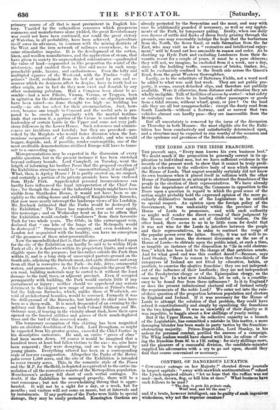'111,E LORDS AND THE IRISH FRANCHISE.
THE proverb says, "Every man knows his own business best." We doubt much, if the proposition be generally correct in its ap- plication to individual men, but we have sufficient evidence in the records of the present week to show that it cannot be truly predi- cated in reference to the collective body of area which composes the House of Lords. That august assembly certainly did not know its own business when it placed itself in collision with the other House of Parliament in an attempt to obstruct the franchises of the people in the election of their representatives. We have already noted the imprudence of setting the Of:1==ns in opposition to the Peers upon a question in regard to which the good sense of the nation might probably hold the expressed opinion of the more pe- culiarly deliberative 'branch of the Legislature to be entitled to special respect. AMi opinion upon the foreign policy of the Government, it was undeniably within the province of the House of Lords to pronounce, and with such authority as might well render the direct reversal of their judgment by the House of Commons an act 9f doubtful wisdom. On the other hand, there seems to us to be little room for doubt that it was not wise for the Lords to interfere between the people and their representatives, in order to contract the verge of the popular power over the latter. Surely, it was not well to re- vive, on such an issue, the dormant discussion on the use of a House of Lords—to obtrude upon the public mind, at such a time, so tangible an instance of the disposition to "lie in cold obstruc- tion," which has been laid to the charge of that patrician senate. And for what good end was this conflict dared ?=Because, says Lord Stanley, "there is reason to believe that two-thirds of the ratepayers of Ireland are not fitted by education, habits, or position, to exercise the eleetive _franchise : they are not independ- ent of the influence of their- landlords; they are not independent of the Presbyterian' clergy or of the Episcopalian clergy, as the case may be.' In what new Atalantis, let us ask,, is a constitu- ency to be found free from those influences ? Is it in England ? or does the present infinitesimal electoral roll of Ireland satisfy the requirements of the noble Lord? We enter net into the rule- of-three question of the proportion between population and electors in England and Ireland. If it was necessary for the House of Lords to attempt the solution of that problem they could have solved it constitutionally and simply by equalizing the franchises in the two kingdoms. It was as unworthy of their dignity as it
was impolitic, to le about a few shillings of yearly rating.
But if the Upper : ouse, in its collective capacity as a branch of the Legislature, has committed a mistake in this matter, a more damaging blunder has been made in party tactics by the franchise- obstructing majority. Prince-Rupert-lilie, Lord Stanley, in his ardour for personal combat, perilled the success of a campaign. The Whig leaders would have shared with him ,,he odium of rais- ing the franchise from 8/. to a 12/. rating : for sixty shillings more, and the pleasure of a successful division, the candidate-minister supplied his adversaries with a cry to go out upon, should they find that course convenient or necessary.


























 Previous page
Previous page